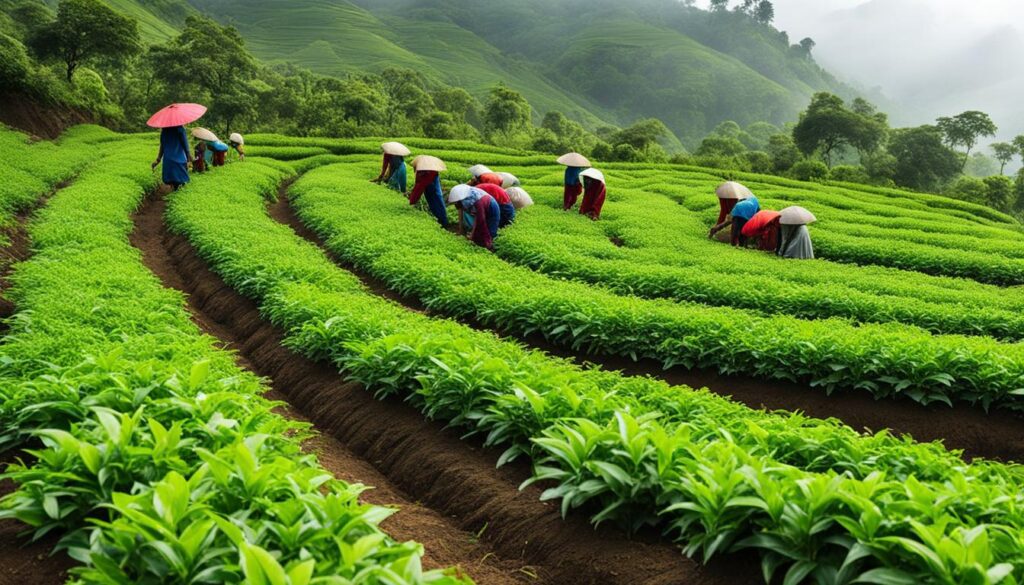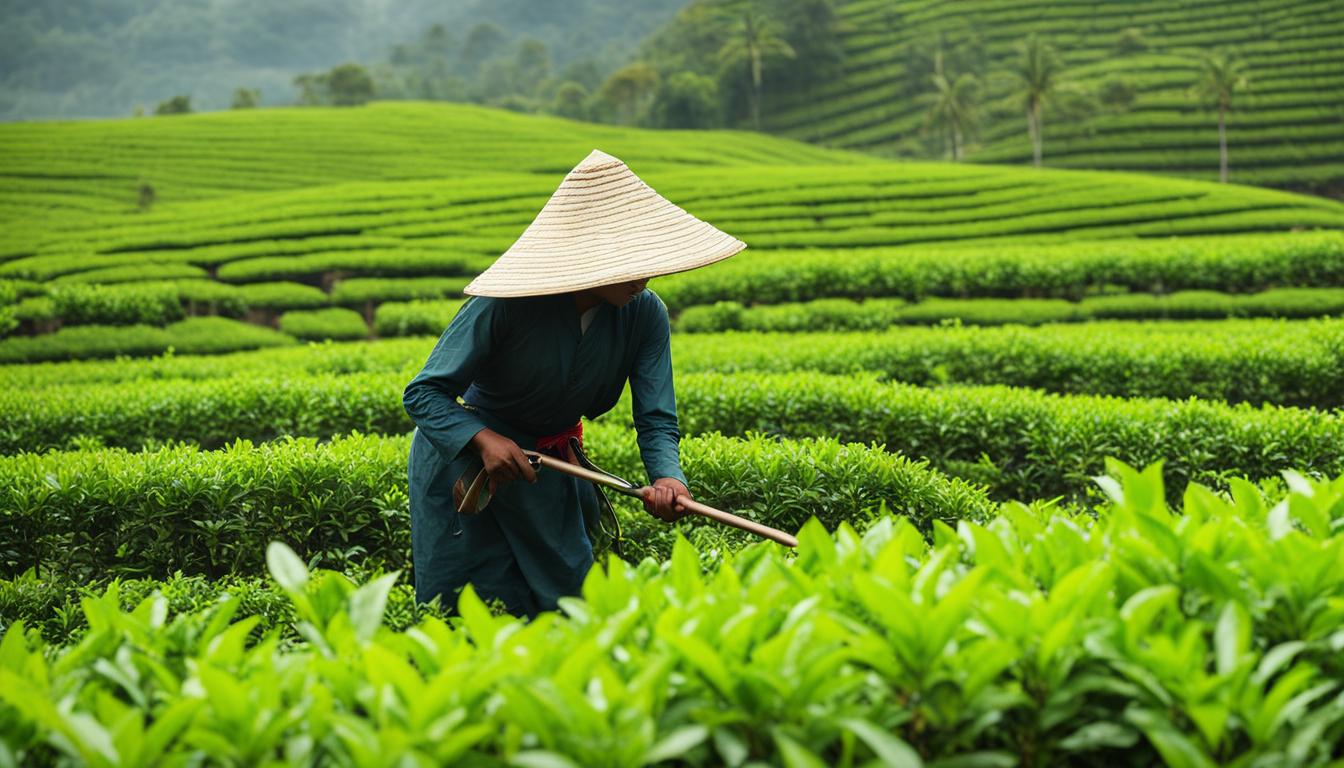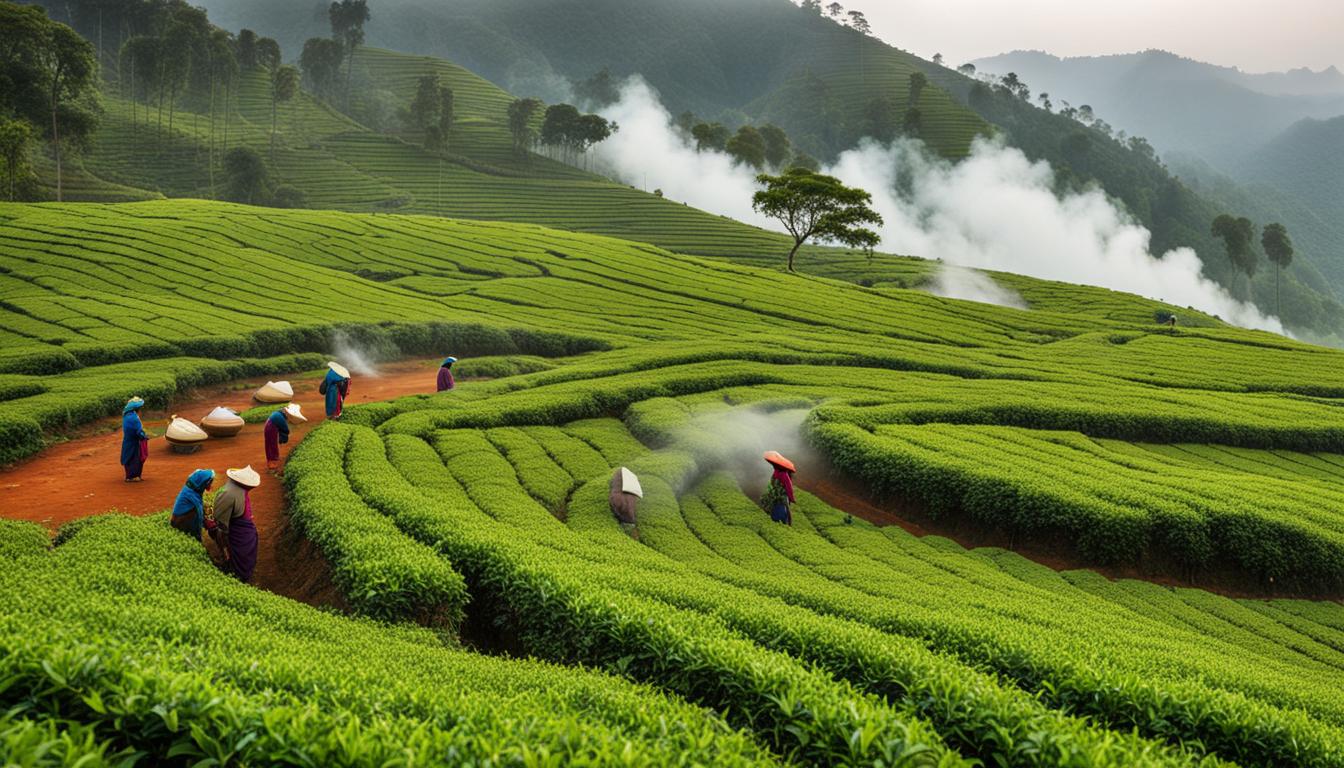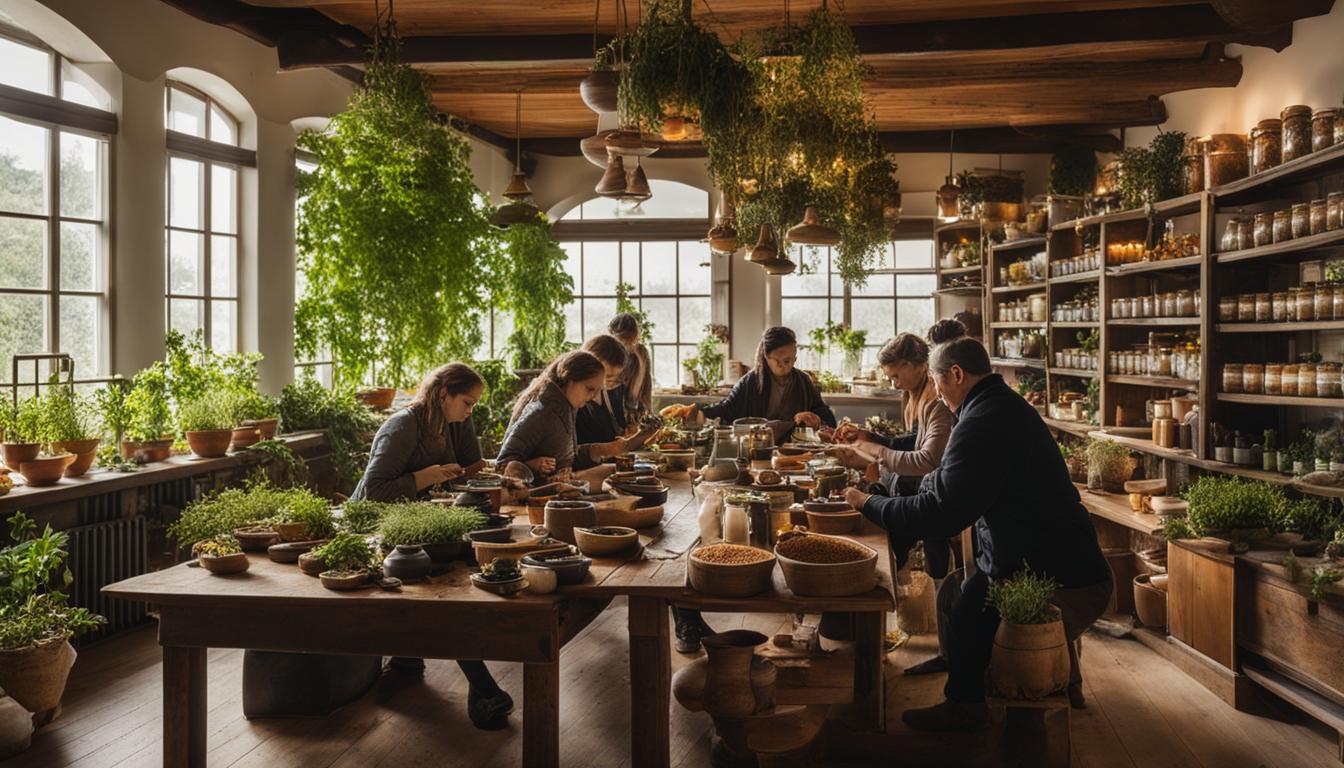Welcome to our blog, where we delve into the world of sustainable tea farming practices! At a time when climate change and environmental concerns are at the forefront of discussions, it is essential to explore innovative approaches to agriculture that promote sustainability and protect our planet. In this article, we will showcase how tea brands like Wild Orchard Tea Company and Numi are leading the way in pioneering sustainable tea farming practices.
Tea, one of the most beloved beverages worldwide, has a significant impact on the environment due to conventional farming methods. However, sustainable tea farming practices offer a promising solution to minimize this impact and create a greener future.
Key Takeaways:
- Implementing sustainable tea farming practices is crucial for addressing climate change and promoting environmental stewardship.
- Companies like Wild Orchard Tea Company and Numi are pioneers in adopting regenerative and organic tea farming methods.
- Sustainable tea farming practices contribute to soil health, protect against pests and diseases, and enhance wildlife habitats.
- Prioritizing fair trade and supporting tea brands that embrace sustainability can have a positive impact on both personal and planetary health.
The Benefits of Regenerative Tea Farming
Regenerative tea farming practices have numerous benefits for both the environment and the quality of tea produced. By implementing eco-friendly agricultural practices, tea farms can contribute to environmental stewardship and conservation efforts in tea production.
One of the key advantages of regenerative tea farming is its ability to remove harmful contaminants from the soil, improving soil health and promoting sustainable agriculture. Through techniques like cover cropping, no tilling, and mulching, tea farms can enhance the fertility and biodiversity of the soil, resulting in healthier tea plants and higher-quality teas.
Moreover, regenerative tea farming plays a crucial role in curbing climate change. By sequestering carbon into the ground, these practices help reduce greenhouse gas emissions and mitigate the effects of global warming. Additionally, the conservation efforts associated with regenerative tea farming, such as agroforestry and the creation of habitats for wildlife and pollinators, contribute to biodiversity preservation and ecosystem balance.
Overall, embracing regenerative tea farming practices not only leads to sustainable tea production but also promotes environmental sustainability in the tea industry. By cultivating tea in an eco-friendly and responsible manner, tea farms can protect the planet’s natural resources, preserve biodiversity, and provide consumers with high-quality, sustainable teas.
The Benefits of Regenerative Tea Farming
| Benefits | Description |
|---|---|
| Improved Soil Health | Regenerative practices like cover cropping and mulching enhance soil fertility and biodiversity, leading to healthier tea plants and better-quality teas. |
| Climate Change Mitigation | By sequestering carbon into the ground, regenerative tea farming helps reduce greenhouse gas emissions and combat global warming. |
| Environmental Stewardship | Conservation efforts in regenerative tea farming, such as agroforestry and habitat creation, contribute to preserving biodiversity and ecosystem balance. |
Kirishima Mountain: A Hub of Organic Tea Farming

Kirishima Mountain, located in Kyushu, Japan, is renowned for its organic tea farming practices and its production of exquisite organic Sencha and matcha teas. Tea farmers in this region are committed to implementing sustainable tea practices and prioritize organic farming methods. They avoid the use of synthetic fertilizers, pesticides, and herbicides, ensuring that their tea cultivation is environmentally friendly and free from harmful chemicals.
The volcanic soil found on Kirishima Mountain is rich in minerals, which contributes to the unique flavor and exceptional quality of the teas grown in this region. The tea plants thrive in this fertile soil, absorbing the natural nutrients and producing leaves that are highly prized by tea connoisseurs.
Additionally, the forested areas on the slopes of Kirishima Mountain play a crucial role in supporting sustainable tea plantation management. These forests provide shade for the tea plants, maintain soil moisture, and create a diverse ecosystem that attracts beneficial insects and wildlife. The preservation of these forested areas is integral to maintaining the sustainability of tea farming on Kirishima Mountain.
Eco-Innovations in Tea Farming
Tea farmers on Kirishima Mountain continuously strive to implement eco-innovations in their farming practices. These innovations focus on minimizing the environmental impact of tea cultivation while maximizing the yield and quality of the teas produced. Examples of eco-innovations include:
- Water conservation techniques such as drip irrigation to minimize water usage
- Integrated pest management strategies to control pests naturally without the use of harmful chemicals
- Composting and organic waste management systems to create nutrient-rich fertilizers for the tea plants
- Agroforestry practices, where tea plants are cultivated alongside complementary trees and shrubs, promoting biodiversity and enhancing soil health
By embracing these eco-innovations, tea farmers in Kirishima Mountain contribute to the long-term sustainability of tea farming and ensure the preservation of this treasured tradition for future generations.
Numi: A Leader in Sustainable Tea Farming
When it comes to sustainable tea farming practices, Numi is a true pioneer in the industry. For over 20 years, this Oakland-based tea company has been committed to producing premium-quality, organic, and fair-trade teas. Sustainability and social welfare are at the core of Numi’s values, as they source organic ingredients from around the world and go above and beyond to make a positive impact.
One of Numi’s significant contributions to sustainability is the launch of the first compostable teabag wrap. By using plant-based materials instead of traditional plastic, Numi is reducing waste and promoting eco-friendly practices. This innovative packaging solution aligns with their commitment to environmental stewardship in the tea industry.
But Numi’s sustainability efforts go beyond tea farming. The company also takes action to improve water access, sanitation, and education in farming communities through their Together for H2OPE initiative. They are dedicated to supporting at-risk children in the Bay Area and Iraq, demonstrating their commitment to social welfare alongside environmental sustainability.
Numi’s leadership in sustainable tea farming extends further through their vertical integration and fair trade commitments. By purchasing directly from farmers, Numi ensures the highest quality ingredients and maintains close relationships with their suppliers. They prioritize fair trade practices through initiatives like Fair Labor Practices certification, which supports farmers’ rights and livelihoods. Additionally, Numi’s sustainable tea farming practices contribute to a lower carbon footprint, thanks to the longevity of tea bushes, minimal tilling, and the region’s abundant rainfall.
Numi’s Sustainability Initiatives at a Glance
| Sustainability Initiative | Description |
|---|---|
| First Compostable Teabag Wrap | Numi’s innovative packaging solution reduces plastic waste and promotes eco-friendly practices. |
| Togetherness for H2OPE | Numi supports water access, sanitation, and education in farming communities through this initiative. |
| Direct Farmer Relationships | Numi’s vertical integration ensures the highest quality ingredients and strengthens farmer partnerships. |
| Fair Labor Practices Certification | Numi prioritizes fair trade practices, empowering farmers and supporting their rights and livelihoods. |
| Low Carbon Footprint | Numi’s sustainable tea farming practices contribute to a lower carbon footprint, promoting environmental sustainability. |
Innovation and Commitment to Sustainable Practices
At Numi, we are dedicated to pushing the boundaries of sustainable tea farming practices. Our commitment to innovation and environmental stewardship drives us to continuously improve and implement green tea production techniques that minimize our impact on the planet.
One of our key initiatives is our introduction of unique tea varieties that offer both exquisite flavors and sustainable benefits. Our Pu-erh and turmeric teas not only provide a delightful sensory experience but also showcase the versatility of sustainable farming methods. By sourcing these ingredients from organic and fair-trade farms, we support farmers who prioritize implementing sustainable tea practices.
In addition to our tea offerings, we have expanded our product range to include wellness beverages like Daily Super Shots and Drinking Chocolates. These innovative blends are carefully crafted using organic ingredients and sustainable production methods. By merging health and sustainability in our offerings, we aim to provide consumers with sustainable options throughout the day, furthering our commitment to environmental stewardship.
“Our dedication to sustainability goes beyond our products. We strive to minimize our environmental impact at every step of the production process.”
Promoting Environmental Stewardship Through Packaging
At Numi, we understand the importance of reducing plastic waste. To address this issue, we have introduced a compostable plant-based overwrap for our teabags. By utilizing innovative packaging materials, we minimize our contribution to the plastic pollution problem and provide consumers with a sustainable alternative.
In addition to our packaging efforts, we have also implemented sustainable practices in our tea farming. Our long-lasting tea bushes require minimal tilling, helping to preserve soil health and prevent erosion. The abundant rainfall in the regions where our teas are sourced reduces the need for irrigation, further reducing our water footprint. These small but significant steps contribute to our overall commitment to environmental sustainability.
At Numi, our dedication to sustainable practices is deeply ingrained in our ethos. Through constant innovation and a commitment to environmental stewardship, we strive to pave the way for a greener future in the tea industry.

Vertical Integration and Fair Trade Commitments
At Numi, we believe that sustainability goes beyond just the farming practices. That’s why we have implemented a vertical integration model, working closely with our tea farmers to ensure the highest quality ingredients and maintain strong relationships with our suppliers. By purchasing directly from farmers, we eliminate unnecessary middlemen, ensuring fair and ethical trade practices throughout our supply chain.
We are committed to fair trade principles and have obtained Fair Labor Practices certification. This means that we prioritize the well-being and fair treatment of our farmers and workers, ensuring they receive fair wages and safe working conditions. Additionally, we support initiatives like Together for H2OPE, which aims to provide clean water access to farming communities in need.
Our commitment to sustainability extends beyond the social aspect. Tea farming is naturally sustainable, with tea bushes lasting for decades and abundant rainfall reducing the need for excessive irrigation. We minimize tilling and prioritize organic farming methods to preserve soil health and biodiversity. Our low carbon footprint is a result of these sustainable practices combined with our efforts to reduce plastic waste through the introduction of our compostable plant-based overwrap for tea bags.
Through our vertically integrated approach, fair trade commitments, and sustainable farming practices, we aim to contribute to a global tea industry that is not only environmentally responsible but also socially and economically equitable. We believe that sustainable tea farming practices are essential for a greener future and are proud to champion these principles in the tea industry.
Championing Sustainable Tea Farming Practices for a Greener Future
Sustainability in the tea industry is no longer just a trend; it’s a necessity. As stewards of the environment, we must embrace eco-friendly tea agriculture practices and prioritize environmental stewardship in tea farming. Companies like Wild Orchard Tea Company and Numi are leading the way, championing sustainable practices that can make a significant impact on our planet.
By adopting regenerative and organic tea farming practices, these companies are not only addressing climate change but also improving soil health. Utilizing techniques such as cover cropping, agroforestry, and fair trade, they are setting an example for the entire industry. Sustainability is not just about producing tea; it’s about creating a greener future for generations to come.
Environmental stewardship in tea farming goes beyond the fields. It extends to every aspect of the process, from sourcing organic ingredients to reducing plastic waste. Companies like Numi are constantly innovating, introducing unique tea varieties and compostable packaging, demonstrating their commitment to sustainability. By supporting these brands and farms, we can play an active role in creating a more sustainable tea industry.
Together, let’s embrace sustainability in the tea industry. By choosing tea brands and farms that prioritize eco-friendly practices, we can contribute to a greener future. Our choices have the power to make a positive impact, not just on our personal health, but also on the health of our planet. Let’s raise our cups to sustainable tea farming for a better tomorrow!
FAQ
What is regenerative organic certification?
Regenerative organic certification is a designation that recognizes agricultural practices that prioritize soil health, animal welfare, and farmworker fairness. It ensures that the farming methods used are holistic and address climate change.
How do regenerative tea farming practices benefit the environment?
Regenerative tea farming practices remove harmful contaminants, restore soil biology, and sequester carbon into the ground. These practices curb climate change, improve soil health, protect against pests and diseases, and enhance wildlife and pollinator habitats.
What makes Kirishima Mountain a hub of organic tea farming?
Kirishima Mountain in Kyushu, Japan is known for its organic agricultural practices and the production of organic Sencha and matcha. The volcanic soil and forested areas on the mountain slopes contribute to the unique flavor and quality of the teas, while traditional cultivation techniques and eco-innovations maintain the sustainability of tea plantations.
What initiatives does Numi take to promote sustainability?
Numi is committed to producing premium-quality, organic, and fair-trade teas. They source organic ingredients from around the world and have launched the first compostable teabag wrap. Numi also improves water access, sanitation, and education in farming communities, as well as supports at-risk children in the Bay Area and Iraq.
How does Numi ensure the highest quality ingredients for their teas?
Numi is vertically integrated, meaning they purchase directly from farmers. This ensures the highest quality ingredients and allows them to maintain close relationships with their suppliers.
How does Numi prioritize fair trade practices?
Numi supports fair trade practices through initiatives like Fair Labor Practices certification. They also provide access to clean water through the Together for H2OPE initiative, further promoting social welfare in tea farming communities.
How does tea farming contribute to sustainability?
Sustainable tea farming practices, such as regenerative agriculture and organic farming, play a crucial role in addressing climate change, improving soil health, and promoting environmental stewardship. By supporting tea brands and farms that prioritize sustainability, individuals can make a positive impact on both personal and planetary health.





